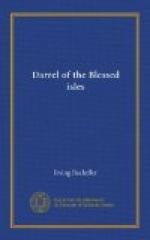There was a bitter contempt in his voice when he said “ol’ maids.”
“I’d kind o’ like t’ draw the ribbons over that mare o’ yourn, mister,” said Tunk, presently.
“Do you think you could manage her?”
“What!” said Tunk, in a voice of both query and exclamation. “Huh! Don’t I look as if I’d been used t’ hosses. There ain’t a bone in my body that ain’t been kicked—some on ’em two or three times. Don’t ye notice how I walk? Heavens, man! I hed my ex sprung ’fore I was fifteen!”
Tunk referred often and proudly to this early springing of his “ex,” by which he meant probably that horse violence had bent him askew.
“Well, you shall have a chance to drive her,” said Trove, spreading his blanket. “But if I’d gone through what you have, I’d keep out of danger.”
“I like it,” said Tunk, with emphasis. “I couldn’t live without it. Danger is a good deal like chawin’ terbaccer—dum nasty ’til ye git used to it. Fer me it’s suthin’ like strawberry short-cake and allwus was. An’ nerve, man, why jes’ look a’ there.”
He held out a hand to show its steadiness.
“Very good,” Trove remarked.
“Good? Why, it’s jest as stiddy as a hitchin’ post, an’ purty nigh as stout. Feel there,” said Tunk, swelling his biceps.
“You must be very strong,” said Trove, as he felt the rigid arm.
“A man has t’ be in the boss business, er he ain’t nowheres. If they get wicked, ye’ve got t’ put the power to ’em.”
Tunk had only one horse to care for at the widow’s, but he was always in “the hoss business.”
Then Tunk lit his torch and went away. Trove lay down, pulled his blanket about him, and went to sleep.
XXIII
A New Problem
When Trove woke in the morning, a package covered with white paper lay on the blanket near his hand. He rose and picked it up, and saw his own name in a strange handwriting on the wrapper. He turned it, looking curiously at seal and superscription. Tearing it open, he found to his great surprise a brief note and a roll of money. “Herein is a gift for Mr. Sidney Trove,” said the note. “The gift is from a friend unknown, who prays God that wisdom may go with it, so it prove a blessing to both.”
Trove counted the money carefully. There were $3000 in bank bills. He sat a moment, thinking; then he rose, and began searching for tracks around the shanty. He found none, however, in the dead leaves which he could distinguish from those of Tunk and himself.
“It must be from my father,” said he,—a thought that troubled him deeply, for it seemed to bring ill news—that his father would never make himself known.
“He must have seen me last night,” Trove went on. “He must even have been near me—so near he could have touched me with his hand. If I had only wakened!”




